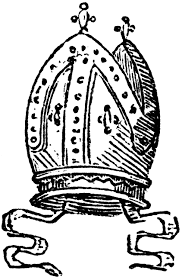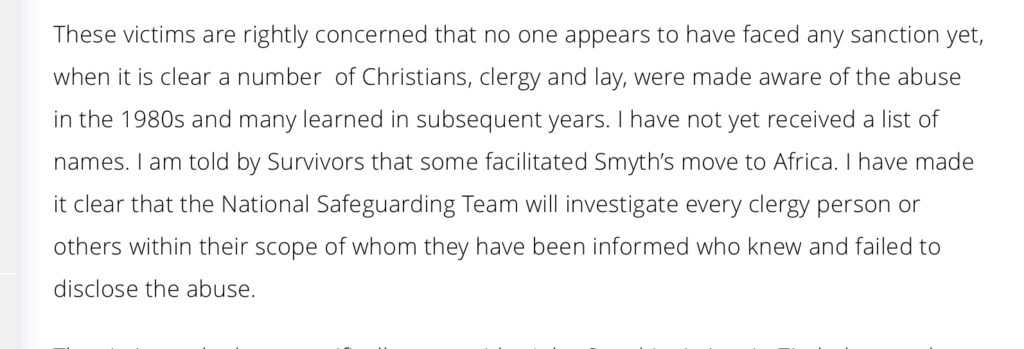
The arrival of 2022 makes us very conscious of the future and what it will bring. There is one part of the Church of England facing definite changes with the imminent retirement of its Bishop: the Diocese of Winchester. I was considering what these changes might involve when I spotted an item on the American website, Anglican Ink. It was about a senior appointment being made in the Diocese. Dr Amy Roche, who already works in ministerial training in the Diocese, has been appointed Dean of Licensed Ministry training across the Diocese of Winchester. The announcement of this appointment tells us that Dr Roche will be responsible for ‘the delivery of mission focused training … through the School of Mission’. Further, ‘she will develop the ministry training programme that helps grow the number of lay and ordained ministers in the Diocese.’
The announcement was delivered to the public and the American website through the agency of Luther Pendragon (LP), the reputation management company. Given the fact that this firm has achieved a certain notoriety in the Church of England for assisting the malcontent dons in their vicious persecution of the Dean of Christ Church Oxford, I sensed that something was not straightforward. I some time ago discovered that this communications firm, which is expert in crisis management, seems to be the go-to firm for the Church of England at a national level and the Diocese of London. A close relationship with the Diocese of Winchester was also apparently developed when the Diocese was having to deal with a deteriorating relationship with the Channel Islands parishes, which were then part of the Diocese. Without attempting to describe the details of that affair, professional communications advice would have been required to deal with the unwelcome press publicity at the time. Since that point, the services of LP seem to have been found useful and the firm is now a permanent feature of the diocesan structure. The name of Ben Frankel, a senior LP partner, appears as the diocesan Director of Communications and all press enquiries are directed through him. The need to employ such a pricey London professional for the mundane tasks of writing uncontroversial press releases is suggestive of one of two things. The first is that the Winchester diocese has found the services of LP so excellent that the senior staff prefer, unlike most other dioceses, to outsource this aspect of diocesan administration. The second possibility is less flattering. This is to suggest that senior staff in the Winchester diocese have found all their dealings with the press in the past so fraught and stressful that they prefer to have permanent access to one of the most prestigious damage limitation firms in the country. The diocese certainly appears to be tied to LP through some sort of contract agreement. Why else would LP’s name appear in something as innocuous at +Debbie’s recent Christmas message? In all fairness, the crises in the diocese that have come into the public domain, particularly over the past six months, perhaps justify this expensive recourse to the skills of LP.
We return to the appointment of Dr Amy Roche as Dean of Licensed Ministry Training (LMT). I have had a look at some of the records of the Winchester School of Mission since it was founded at the instigation of +Dakin early in his episcopal ministry. LMT is one part of the work of the school and it is very close to the heart of the Bishop’s vision for the diocese. The Church of England Ministry Council produced an External Review Report in May 2019, and it is clear that this local home-grown scheme for training ministers, lay and ordained, is working well. The inspectors had a few minor recommendations to make, but they seemed to approve of the standards of training being offered. From the Council report, I was unable to discern how many are enrolled for ordination courses and how many are seeking to enter a licensed lay ministry. The figure of seventy was mentioned in the course of the report and that presumably covers the total number of the students then under training.
There are two points of caution to be noted at this point. The first is that the Council inspectors observed in 2019 that the emphasis on mission was an episcopally-led impulse. In other words, the ‘culture’ of the whole School of Mission was strongly tuned into the Bishop’s own priority for mission/evangelism. This in turn would be linked back to his own early Christian ministry of teaching and evangelism which took place in the missionary setting of Kenya. The imminent retirement of the Bishop in February next will leave a gap, and the impetus set by him for prioritising mission and evangelism will no doubt be affected. The second point to be drawn is the mention of numbers in the recent LP press release. It mentions that there are currently 42 students in training. This is 28 fewer than in 2019 when the Ministry Council report was written.
The numbers of individuals enrolled on a training scheme would not normally matter. Cohorts of students coming forward for training will vary in size and one year’s shrinkage is made up in another year when there is an expansion. But the situation at the moment is critical. With the current bishop about to retire and the prospect of another bishop being swiftly appointed somewhat remote, the state of health of all +Dakin’s initiatives is a matter of concern. Although the Winchester School of Mission’s schemes have achieved success in several areas, this initiative for mission is bound to lose momentum now that the Bishop can no longer offer his leadership and vision to energise the programmes and initiatives. The main issue is money. There are at least ten individuals named on the diocesan website as having responsibilities within the School of Mission. This represents a huge human/financial investment which a future bishop may wish to modify. In short, the question is this: Can the Winchester diocese really afford all the institutions and initiatives of the soon to be former bishop? As a further exercise I counted the people directly employed by the Diocese. These amount to 72. Not all will be full-time, but this number still represents a massive deployment of finite resources. Will all these posts survive the arrival of a new broom?
Dr Roche seems a thoroughly decent and honourable person but even she must feel the icy winds that swirl round the future activities of the Winchester diocese. Looking at the appointment from afar, the question arises, who was responsible for promoting her within the School of Mission structure? She was already working as an assistant in the department, and many of the tasks she will be taking on could have been undertaken by her within her existing job description. Meanwhile the final departure of +Dakin hangs over the whole diocese like a very dark cloud. Questions like the availability of a decent episcopal candidate for the post in the future remain. In the context of the acute financial woes apparently being experienced by the Diocese, does it make any sense at all to announce a senior appointment of this kind? Surely everyone can see that a pruning knife is hanging over so many of what could be regarded as bloated structures within the diocese.
Two final thoughts. Is the timing of the appointment announcement so near Christmas aimed at attracting the least possible notice? There must be many among the parochial clergy in the diocese who know someone who has lost paid employment and are acutely aware of what appear to be over-staffed structures at the centre. Also, has anyone else noticed the irony of paying top rates to a London based communications director to announce the appointment of someone to head up a part of the School for Ministry? It is likely that the Diocese of Winchester will have to retrench in a variety of ways in order to break even in the future. One more senior appointment made now will make that process just a little more difficult for a future bishop. I am reminded of a story when a Labour minister left a note for his Tory successor after a general election. The note said something to the effect, there is no money left, we have spent it all! Is such a message being sent by one bishop of Winchester to another? In spite of the cessation of +Dakin from all duties in the diocese, are we witnessing his hand in a final exercise of episcopal patronage? After all the sums expended on the Channel Islands shenanigans, the rumoured redundancies and accompanying NDAs, together with the hugely expensive setting up of all the mission initiatives, what is one small appointment in the scheme of things?






